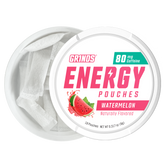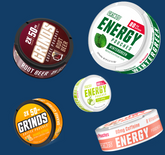What are Nicotine Withdrawal Symptoms & How Long do they Last?
 What are the nicotine withdrawal symptoms? And, how long do nicotine withdrawal symptoms last? Today, we're going to answer these two questions and help you prepare for the journey you're going to embark on. We're going to set you up for success to help you kick the habit once and for all - with as little misery as possible.
What are the nicotine withdrawal symptoms? And, how long do nicotine withdrawal symptoms last? Today, we're going to answer these two questions and help you prepare for the journey you're going to embark on. We're going to set you up for success to help you kick the habit once and for all - with as little misery as possible.
Whether you're preparing to quit dip, chew, vaping, or smoking - or you're in the midst of your battle right now - you need to be prepared for what's to come. Particularly, the physical and mental withdrawal symptoms.
Most nicotine users are aware that quitting is one of the toughest mental battles they'll face. But did you know you'll also feel the effects of your addiction physically?
Fortunately, there are solutions to make quitting nicotine easier. With Grinds caffeine pouches, you can keep cravings at bay while enhancing your productivity - and more importantly, your overall well-being. We'll touch on the role Grinds plays in your decision to quit nicotine once and for all today - but before all that, let's address the main question you came here with - what are nicotine withdrawal symptoms?
What are Nicotine Withdrawal Symptoms You May Feel Along This Journey?
We're going to break this discussion down into two different segments: the physical withdrawal symptoms and the mental withdrawal symptoms. Let's begin with what you'll physically feel before discussing the mental battle - which, for most, is the hardest part.
What are Physical Nicotine Withdrawal Symptoms You May Feel?
When you quit nicotine, you can expect to experience a variety of physical withdrawal symptoms. But - what happens when you quit dipping exactly? While symptoms may vary in intensity from person to person - and you may not even feel all of these - here are some of the most common:
Headaches
Headaches are one of the most common physical withdrawal symptoms from nicotine. They can range in intensity from mild to severe, and often persist for several days. Some people also experience a sense of pressure in the head, as well as sensitivity to light and sound.
Fatigue
You may feel incredibly exhausted when you quit nicotine. This is likely due to the way nicotine affects your energy levels - after all, it's a stimulant. You may feel depleted for several weeks or even months after quitting.
Eventually, you will adapt to the "new norm" of energy levels your body produces. Leaning on more natural energy solutions like Grinds can help in the meantime.
Coughing and Sneezing
Nicotine can cause irritation in your throat and lungs, which often worsens when you quit. You may experience an increase in coughing and sneezing, particularly in the beginning stages of quitting.
Of course, this is more common in smokers and vapers - but those who dip will experience some degree of nasal & lung agitation, too.
This is a good thing - you can think of it as your body expelling all that nasty nicotine you've ingested or inhaled over the years.
Constipation or Diarrhea
This particular nicotine withdrawal symptom catches many off guard - but you may also find irregularity with your bowel movements. That's because nicotine affects your digestive system - and when you take it away, your body struggles to react.
This ends up leading to constipation or diarrhea. These symptoms often arise within the first few days or weeks after quitting. Focusing on gut health while you detox can help.
Trouble Sleeping
Quitting nicotine can also disrupt your sleep patterns, leaving you feeling tired and exhausted throughout the day. You may find it difficult to fall or stay asleep for several weeks after quitting.
Hunger and Cravings
You may also experience intense hunger and cravings for sugary or fatty foods. This is because nicotine suppresses your appetite, so once you stop using it - your body starts demanding food.
This can lead to weight gain immediately following your decision to quit nicotine. Don't be upset about this - that's likely healthy weight gain you're experiencing. You can take extra efforts to work out if you want to keep that weight off.
What are Mental Nicotine Withdrawal Symptoms You May Feel?
As discussed in our complete guide on the most common quitting dip withdrawal symptoms, the physical side of things is perhaps the easiest to cope with. It's the mental battle that many are unprepared for.
The fact of that matter is that quitting any sort of addiction is tough mentally. You're reprogramming your brain to live without a substance you've relied on for some time - and there will be a period where your brain plays tricks on you - signaling cravings.
You may not even realize you're reaching for a can of dip or pack of smokes until you pat your pocket and realize it's empty - that's how deeply rooted this addiction can be! You may also experience symptoms like anger, moodiness, depression, and more. Let's unpack all this more in-depth below, starting with the most difficult symptom to struggle with: cravings.
Nicotine Cravings
Keeping your nicotine cravings at bay is likely the hardest part of quitting nicotine. It's all too easy to give into this temptation and pop "one last chew" or light "one last cigarette". The problem is, this "one last" tends to extend way beyond a single one-off - and you're soon back down the rabbit hole of addiction.
The best way to cope with nicotine cravings is to find healthy alternatives that can satisfy your needs. This could be anything from eating a snack or going for a walk when you get a craving - but far and away the best solution is Grinds. Our nicotine free pouches and nicotine free dip are here to help you keep cravings at bay.
We'll talk more about this later on as we discuss ways to cope with all the physical and mental withdrawal symptoms of nicotine. Just know that no matter what, cravings will come and go throughout your journey. Don't feel discouraged if you have trouble keeping them under control - just make sure you have solutions you can rely on to prevent relapse!
Brain Fog
Brain fog is a common symptom of nicotine withdrawal, meaning you may not think or process information as quickly as normal. You'll also find it difficult to focus, remember things, and even make decisions and problem-solve. Caffeine can help with this, just as it can your physical energy levels.
Irritability and Moodiness
You may also feel irritable and moody as your body adjusts to life without nicotine. This is due to the fact that nicotine affects your brain chemistry, so when it's removed, you can experience mood swings. We recommend you let those around you know that you're quitting nicotine and that you may not act like yourself for a little while.
Anxiety and Depression
Finally, you may also experience anxiety or depression as part of the withdrawal process. This is because nicotine can actually improve your mood in the short term, but when you remove it, the lows can be more intense. This is followed by the highs of quitting, but it's important you talk to a professional if your anxiety or depression seems more extreme than normal.
How Long do Nicotine Withdrawal Symptoms Last?
Now that we've answered the first question on today's agenda - what are nicotine withdrawal symptoms - let's move on to another really important question for anyone planning to quit or currently in the process. How long do nicotine withdrawal symptoms last?
The good news is that most nicotine withdrawal symptoms will go away within two weeks. That's not to say you won't still experience cravings or other side effects beyond this time, but the physical and mental symptoms should start to improve drastically.
How Can You Help Cope With the Symptoms of Nicotine Withdrawal?
The good news is that there are a number of things you can do to help ease the physical and mental anguish associated with nicotine withdrawal:
Reach Out To A Support Group
Many people find it helpful to talk to others who are going through the same thing. There are many online support groups as well as face-to-face groups available across the country.
See A Doctor Or Therapist
If you're struggling with intense physical or mental withdrawal symptoms, it may be helpful to see a doctor or therapist for assistance. They can provide you with medications or therapies to help make quitting nicotine easier.
Use Nicotine Replacement Therapy (NRT)
Nicotine replacement therapies such as gum, patches, or lozenges can help reduce cravings and ease the withdrawal process. Be sure to speak with your doctor before starting any type of NRT therapy.
Stay Busy
Nicotine cravings tend to be less intense when you're busy doing something else. Try to find activities that help keep your mind off smoking or chewing tobacco.
Grinds!
At Grinds, we've created the best dip alternatives and chewing tobacco alternatives the industry has to offer. Even if your nicotine addiction was specific to smoking or vaping, Grinds can help. This isn't just about finding a healthy replacement for cravings, either - although Grinds is the best choice for that as well. It's also about the physical effects Grinds produces.
With a boost of caffeine to help you power through the day, you'll experience less fatigue and brain fog. You'll also find that you're far less irritable and moody when you have enough energy to get your work done.
But the best part is how many different fun, exciting flavors we have for you. Whether you want the simple spearmint, wintergreen, or coffee flavors or something more unique like Irish Cream, cinnamon whiskey, or caramel - we've got something you're sure to love. Learn more and grab your first few cans today!
What are the Withdrawal Symptoms of Nicotine? Wrapping Things Up
There you have it. We've answered three important questions for anyone starting to take quitting nicotine more seriously:
- What are the withdrawal symptoms of nicotine?
- How long do nicotine withdrawal symptoms last?
- How do you make quitting nicotine easier?
At this point, you should feel more confident in starting your own journey to quitting nicotine once and for all. Just grab your Grinds and you'll be well on your way to living a healthier, nicotine-free lifestyle!
And if you want to learn a bit more about the battle you're up against, we have a complete guide on how to quit chewing tobacco tips. You may also be interested in our article discussing the notorious nicotine vs caffeine debate.






